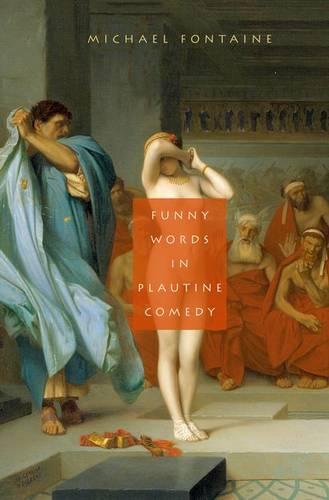Full Product Details
Author: Michael Fontaine (Assistant Professor of Classics, Assistant Professor of Classics, Cornell University)
Publisher: Oxford University Press Inc
Imprint: Oxford University Press Inc
Dimensions:
Width: 22.90cm
, Height: 2.20cm
, Length: 15.20cm
Weight: 0.649kg
ISBN: 9780195341447
ISBN 10: 0195341449
Pages: 328
Publication Date: 14 January 2010
Audience:
College/higher education
,
Professional and scholarly
,
Undergraduate
,
Postgraduate, Research & Scholarly
Format: Hardback
Publisher's Status: Active
Availability: To order

Stock availability from the supplier is unknown. We will order it for you and ship this item to you once it is received by us.
Reviews
Every reader of this work will find out for himself what to accept, what to doubt and what to refuse. But all the scholars who are interested in Plautine comedy should read this innovative book. Ancient History Bulletin Online Reviews
Every reader of this work will find out for himself what to accept, what to doubt and what to refuse. But all the scholars who are interested in Plautine comedy should read this innovative book. --Ancient History Bulletin Online Reviews a bold approach that seeks to unlock the puzzle of all these passages with a unified explanation that calls for a radical reappraisal of Plautine comedy. --Greece and Rome This is a superb study of Plautine verbal play, both in its originality and in its far-reaching implications for Plautus' dramatic art. Anyone interested in exploring the complex adaptation, and especially at this critical juncture in the process, will learn much from Fontaine's pellucidly argued, refreshingly jargon-free, and richly indexed study of Plautus' funny words. --New England Classical Journal
<br> a bold approach that seeks to unlock the puzzle of all these passages with a unified explanation that calls for a radical reappraisal of Plautine comedy. --Greece and Rome<p><br> This is a superb study of Plautine verbal play, both in its originality and in its far-reaching implications for Plautus' dramatic art. Anyone interested in exploring the complex adaptation, and especially at this critical juncture in the process, will learn much from Fontaine's pellucidly argued, refreshingly jargon-free, and richly indexed study of Plautus' funny words. --New England Classical Journal<p><br>
Every reader of this work will find out for himself what to accept, what to doubt and what to refuse. But all the scholars who are interested in Plautine comedy should read this innovative book. --Ancient History Bulletin Online Reviews a bold approach that seeks to unlock the puzzle of all these passages with a unified explanation that calls for a radical reappraisal of Plautine comedy. --Greece and Rome This is a superb study of Plautine verbal play, both in its originality and in its far-reaching implications for Plautus' dramatic art. Anyone interested in exploring the complex adaptation, and especially at this critical juncture in the process, will learn much from Fontaine's pellucidly argued, refreshingly jargon-free, and richly indexed study of Plautus' funny words. --New England Classical Journal Funny Words in Plautus is an accessible, densely argued work that will inspire future commentators at more than one point to rethink whatever Plautine text is the target of their labors. It's also a deft and engaging work of literary criticism, teaching its readers how much can be achieved by engaging in the kind of discursive philological and theoretical arguments that Michael Fontaine handles so well. --Bryn Mawr Classical Review
Author Information
Michael Fontaine is Assistant Professor of Classics, Cornell University.



